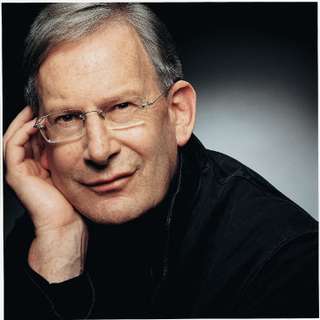|
Back
Thanks Migros Zurich
Tonhalle
10/22/2010 -
Robert Schumann: ”Manfred”: Overture op. 115 – Symphony No. 3 “Rhenish” op. 97
Johannes Brahms: Double Concerto for violin and cello op. 102
Thomas Zehetmair (Violin), Christian Poltéra (Cello)
Orchestre Révolutionnaire et Romantique, Sir John Eliot Gardiner (conductor)

J.-E. Gardiner
Migros are best known in Switzerland as a major chain of retailers; their founder, Gottlieb Duttweiler, was a great philanthropist who wished to encourage a wider and knowledge of the arts. Migros now does this by making them more accessible and more affordable, financing and subsidising certain opera and concert performances. The Migros-Kulturprozent-Classics have, for many years now, arranged tours of well-known orchestras around Switzerland which this season will include the London Symphony Orchestra under Valery Gergiev, the Shanghai Philharmonic Orchestra under Muhai Tang and the Academy of St. Martin-in-the-Fields under Julia Fischer. The British orchestra with the French name Orchestre Révolutionnaire et Romantique under their founder and Principal Conductor Sir John Eliot Gardiner were first in the series. This period instrument orchestra was founded in 1989 to bring stylistic accuracy to the music of the 19th and early 20th centuries.
To celebrate the 200th anniversary of Schumann’s birth, Gardiner brought us two of the composer’s works.
Schumann’s overture to Manfred is based on Byron's drama of the same name. Gardiner launched into the work with its three agitated chords, and was soon extracting all the necessary drama from the passionate themes in the piece. Gardiner revelled in the energetic and vehement development of the work. It made for an excellent start.
The Brahms Double Concerto fared less well.
The work, in fact, has a link to Switzerland: Brahms was motivated to write the piece by the natural beauty of the Lake Thun region where Brahms was spending his summer holidays.
The work has its difficulties for audiences: even today we expect concertos with emotional and virtuosic flair, rather than what Brahms delivers: a conservative orchestral work where the soloists’ input is controlled.
Zehetmair and Poltéra were well matched, and their rapport was exemplary, but they were just too stiff and, even if Brahms did not call for ostentatious display, the music just did not catch fire. Both soloists displayed impeccable techniques of pure tone, precision and poise, but lacked much emotional warmth. The orchestra, at times, sounded under-rehearsed. It did not help that the orchestra’s strings sounded thin and the woodwind lacked all character.
The Double Concerto still is rarely heard in concert. The problem, perhaps, is that it requires superstar soloists, rare in these times of financial strictures. It fares far better on record.
Schumann’s Symphony in E flat, though numbered the Third, was the Fourth in order to composition, and is familiarly known as The Rhenish, the title being derived from the impressions of life in the Rhineland made on the composer.
Gardiner, a tall athletic man, moulded the opening noble theme with consummate skill. He is best renowned, apart from his well regarded Beethoven interpretations, for his work with the Monteverdi Choir, where both care and precision are demanded. He obtained the same level of attention from his orchestral players, even though again the woodwind were often inaudible and strings never overwhelmed.
Gardiner enjoyed the good nature and humour of the Scherzo, executed with charm and precision. The whooping horns were the outstanding feature of the final lively movement.
It was a performance to savour.
John Rhodes
|